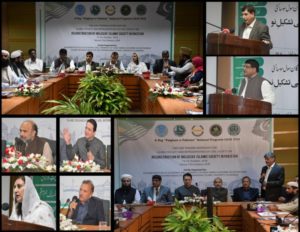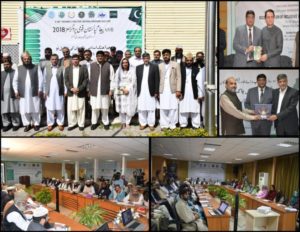 Islamic Research Institute, International Islamic University, Islamabad organised a two-day workshop in collaboration with The University of Azad Jammu & Kashmir, Muzaffarabad on “Reconstruction of an Inclusive Islamic Society in the light of Paigham-e-Pakistan”. The event was attended by renowned academicians and religious scholars, Ulama, and representatives of Civil Society from across Kashmir region at AJK University, City Campus, Muzaffarabad.
Islamic Research Institute, International Islamic University, Islamabad organised a two-day workshop in collaboration with The University of Azad Jammu & Kashmir, Muzaffarabad on “Reconstruction of an Inclusive Islamic Society in the light of Paigham-e-Pakistan”. The event was attended by renowned academicians and religious scholars, Ulama, and representatives of Civil Society from across Kashmir region at AJK University, City Campus, Muzaffarabad.
The inaugural session was chaired by Shah Ghulam Qadir (Speaker Legislative Assembly, Kashmir). In his address, he hailed the efforts of Pakistan army and security forces in countering terrorism; meanwhile he stressed on the need of forging unity in order to thwart nefarious design of the enemy in spreading extremism, and establishing peace as well as ensuring stability in the country.
The regular session was conducted by Prof. Dr. Muhammad Zia ul Haq (Director, General Islamic Research Institute-IIUI), Prof. Dr. Syed Nisar Hussain Hamdani (Director, Kashmir Institute of Economics-AJK University, Muzafarabad) and Prof. Dr. Muhammad Khan (Dept. of Politics and IR-IIUI). Interactive sessions were proceeded by the speakers and worth-noted recommendations were observed by the partici pants.
pants.
During concluding session, Chairman Council of Islamic Ideology, Prof. Dr. Qibla Ayaz shared his views about Paigham-e-Pakistan. He was of the view that Paigham-e-Pakistan’s narrative depends on inclusiveness which can be adopted by following the sayings of Prophet (PBUH) and his followers. Prof. Dr. Kaleem Abbasi (Vice Chancellor-AJK University) highlighted the dilemma of feudal system of our society and stressed upon the need to prevent violent extremism and extremist mindsets that are the root-cause of chaos in the society.
While addressing the participants, the chief guest of the closing ceremony, Barrister Syed Iftikhar Ali Gillani (Education Minister, AJK) praised the efforts of IRI on Paigham-e-Pakistan’s initiative and ensured full support by the people of Azad Jammu and Kashmir in implementing the narrative of Paigham-e-Pakistan.

